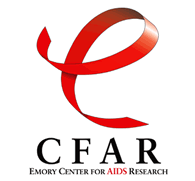News Release: Research, School of Medicine
Jul. 14, 2009
Emory Joins International HIV Prevention Trials Network
 For information about CFAR, go to http://www.sph.emory.edu/CFAR/.
For information about CFAR, go to http://www.sph.emory.edu/CFAR/.Emory University's HIV Clinical Trials Unit has been selected to join the NIH-sponsored HIV Prevention Trials Network (HPTN). This worldwide collaborative clinical trials group develops and tests non-vaccine interventions designed to prevent the transmission of HIV. HPTN is funded through the Division of AIDS of the National Institute of Allergy and Infectious Diseases of the National Institutes of Health, with support from other Institutes/Centers of the NIH.
Emory researchers will receive a grant of approximately $4.8 million over three years for participation in HPTN. The Emory HIV Clinical Trials Unit will soon begin recruiting patients for its first two clinical studies in the HPTN. One study will estimate the overall HIV incidence rate in at-risk women in the United States and evaluate the feasibility of evaluating a cohort of these women. Another study will assess the feasibility of an intervention among African-American men who have sex with men.
The clinical trials for the HPTN will be conducted by Emory Center for AIDS Research (CFAR) investigators at the Ponce de Leon Center of the Grady Health System in midtown Atlanta and at the Hope Clinic of the Emory Vaccine Center in downtown Decatur. The Ponce de Leon Center houses the outpatient infectious disease clinics of the Grady Health System and is one of the largest and most comprehensive HIV/AIDS treatment facilities in the country.
"Prevention approaches are currently the most effective way to address the HIV pandemic, but they can be surprisingly challenging," says HPTN site leader Carlos del Rio, MD, chair of the Department of Global Health at the Rollins School of Public Health and professor of medicine in Emory School of Medicine. "Tremendous strides in antiretroviral therapy have saved countless lives over the past decade and intensive research is underway to discover an HIV vaccine. The biggest impact on the disease comes from preventing transmission, and we are very pleased to be joining the largest international HIV prevention network."
"The beginning of these prevention trials in Atlanta is a welcome step in our efforts to develop improved methods to reduce HIV transmission in the United States", says Emory HIV treatment investigator Jeffrey Lennox, MD, professor of medicine. "Transmission rates remain high in the South, compared to other regions, and we look forward to working with our community partners to begin to address this problem in new and creative ways."
The HPTN focuses on four research areas for HIV prevention: antiretroviral therapies, behavioral interventions, STD control and substance abuse. Because HIV is transmitted in different ways, in different populations, multiple prevention strategies are used to provide the greatest impact on slowing spread of the virus worldwide.
The HPTN network includes multi-disciplinary teams of behavioral, clinical, epidemiological, laboratory, operations and statistical researchers. The research agenda emphasizes cross-cultural comparisons among different populations and underscores a commitment for community involvement and inclusion of ethical practices in the design and conduct of the Network research studies.
HPTN Principal Investigators at Emory are:
Jeffrey Lennox, MD, is a professor of medicine in the Division of Infectious Diseases at Emory and the principal investigator of the Emory HIV/AIDS Clinical Trials Unit. Dr. Lennox is a nationally recognized clinical and translational researcher and is chief of the medical service at Grady Health System. The Grady infectious disease program provides medical care to over 4,500 HIV-infected patients and is one of the largest multidisciplinary HIV/AIDS care clinics in the United States.
Carlos del Rio, MD, is chair of the Hubert Department of Global Health in Emory's Rollins School of Public Health, professor of medicine in the Division of Infectious Diseases at Emory, and the principal investigator at Emory for the HPTN trials. Dr. del Rio is an internationally recognized expert in HIV prevention, and in the training of scientists who study HIV in the international setting. He will be leading the HPTN prevention trials in Atlanta.
Paula Frew, PhD, MPH, is assistant professor of medicine in the Division of Infectious Diseases in Emory School of Medicine and in Behavioral Sciences and Health Education at the Rollins School of Public Health. She is an expert in developing improved methods to engage under-represented communities in HIV prevention research. Dr. Frew will be the lead investigator of a protocol studying the infection rates, and risks for infection, among African-American women in Atlanta.
David Malebranche, MD, is assistant professor of medicine and an expert on HIV transmission risks among men who have sex with men (MSM). He will be leading a large protocol studying HIV transmission among African-American MSM.
Gina Wingood, ScD, MPH, is a professor of behavioral sciences and health education at Emory's Rollins School of Public Health and director of the CFAR Behavioral Sciences Core. Dr. Wingood is an expert in behavioral interventions that reduce the risk of HIV and sexually transmitted infections among women and heterosexual couples and is a member of the national leadership team for the HPTN.
More Information
For more information about HIV prevention trials at Emory, call 877-424-4673 or go to www.hopeclinic.emory.edu.
For information about CFAR, go to www.sph.emory.edu/CFAR/.
###
The Robert W. Woodruff Health Sciences Center of Emory University is an academic health science and service center focused on missions of teaching, research, health care and public service. Its components include schools of medicine, nursing, and public health; Yerkes National Primate Research Center; the Emory Winship Cancer Institute; and Emory Healthcare, the largest, most comprehensive health system in Georgia. The Woodruff Health Sciences Center has a $2.3 billion budget, 17,000 employees, 2,300 full-time and 1,900 affiliated faculty, 4,300 students and trainees, and a $4.9 billion economic impact on metro Atlanta.
Learn more about Emory’s health sciences:
Blog: http://emoryhealthblog.com
Twitter: @emoryhealthsci
Web: http://emoryhealthsciences.org
